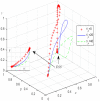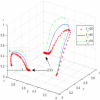Environmental Regulation, Greenwashing Behaviour, and Green Governance of High-Pollution Enterprises in China
- PMID: 36231837
- PMCID: PMC9566786
- DOI: 10.3390/ijerph191912539
Environmental Regulation, Greenwashing Behaviour, and Green Governance of High-Pollution Enterprises in China
Abstract
This study analyses the relationship between greenwashing behaviour, a lack of government supervision, and imperfect green certification mechanisms in China. To improve green governance and greenwashing governance in light of rent-seeking behaviour between high-pollution enterprises and third-party green certification institutions (GCIs), we construct a tripartite game model for the green governance system using an evolutionary game and analyse the interaction and evolutionary trajectory between the three parties. Our results indicate that increasing local government incentives and penalties not only facilitate strengthened green governance by high-pollution enterprises that do not greenwash but also help third-party GCIs to decline to engage in rent-seeking. However, increased incentives lead to relaxed governmental supervision. In addition, the government's incentives and penalties only meet conditions that each agent's total incentives and penalties exceed its speculative gain, and green governance systems can be effectively prevented from resulting in unsatisfactory and unstable strategies. Moreover, the accountability that higher levels of government have to local governments effectively enables high-pollution enterprises' refusal to greenwash and third-party GCIs' refusal to engage in rent-seeking. Our results counsel further research on environmental regulation, green governance, and enterprises' greenwashing, with theoretical and practical applications for both policymakers and enterprises.
Keywords: environmental regulation; evolutionary game; green governance; greenwashing behaviour; high-pollution enterprises; rent-seeking.
Conflict of interest statement
The authors declare no conflict of interest.
Figures














Similar articles
-
Pharmaceutical enterprises integrity supervision strategy when considering rent-seeking behavior and government reward and punishment mechanism.PLoS One. 2025 May 19;20(5):e0320964. doi: 10.1371/journal.pone.0320964. eCollection 2025. PLoS One. 2025. PMID: 40388539 Free PMC article.
-
The Relationship among Government, Enterprise, and Public in Environmental Governance from the Perspective of Multi-Player Evolutionary Game.Int J Environ Res Public Health. 2019 Sep 11;16(18):3351. doi: 10.3390/ijerph16183351. Int J Environ Res Public Health. 2019. PMID: 31514308 Free PMC article.
-
Evolutionary game analysis of factors influencing green innovation in Enterprises under environmental governance constraints.Environ Res. 2024 May 1;248:118095. doi: 10.1016/j.envres.2023.118095. Epub 2024 Jan 23. Environ Res. 2024. PMID: 38272295
-
No End in Sight? A Greenwash Review and Research Agenda.Organ Environ. 2024 Jun;37(2):221-256. doi: 10.1177/10860266231168905. Epub 2023 May 9. Organ Environ. 2024. PMID: 39091586 Free PMC article. Review.
-
Integrating Green Care Initiatives into Conventional Health Systems: Which Governance Dimensions Can Guide This Process?Int J Environ Res Public Health. 2025 Jan 30;22(2):202. doi: 10.3390/ijerph22020202. Int J Environ Res Public Health. 2025. PMID: 40003428 Free PMC article. Review.
Cited by
-
Environmental Governance Goals of Local Governments and Technological Innovation of Enterprises under Green Performance Assessment.Int J Environ Res Public Health. 2023 Jan 21;20(3):1996. doi: 10.3390/ijerph20031996. Int J Environ Res Public Health. 2023. PMID: 36767363 Free PMC article.
References
-
- Zhang Y., Xing C., Wang Y. Does green innovation mitigate financing constraints? Evidence from China’s private enterprises. J. Clean. Prod. 2020;264:121698. doi: 10.1016/j.jclepro.2020.121698. - DOI
-
- Chen Y.S., Chang C.H. Greenwash and green trust: The mediation effects of green consumer confusion and green perceived risk. J. Bus. Ethics. 2013;114:489–500. doi: 10.1007/s10551-012-1360-0. - DOI
-
- Moser A.K. Thinking green, buying green? drivers of pro-environmental purchasing behaviour. J. Consum. Mark. 2015;32:167–175. doi: 10.1108/JCM-10-2014-1179. - DOI
-
- Netto S.V.D.F., Sobral M.F.F., Ribeiro A.R.B., Soares G.R.D.L. Concepts and forms of greenwashing: A systematic review. Environ. Sci. Eur. 2020;32:19. doi: 10.1186/s12302-020-0300-3. - DOI
-
- Testa F., Miroshnychenko I., Barontini R., Frey M. Does it pay to be a greenwasher or a brownwasher? Bus. Strat. Env. 2018;27:1104–1116. doi: 10.1002/bse.2058. - DOI
Publication types
MeSH terms
LinkOut - more resources
Full Text Sources

